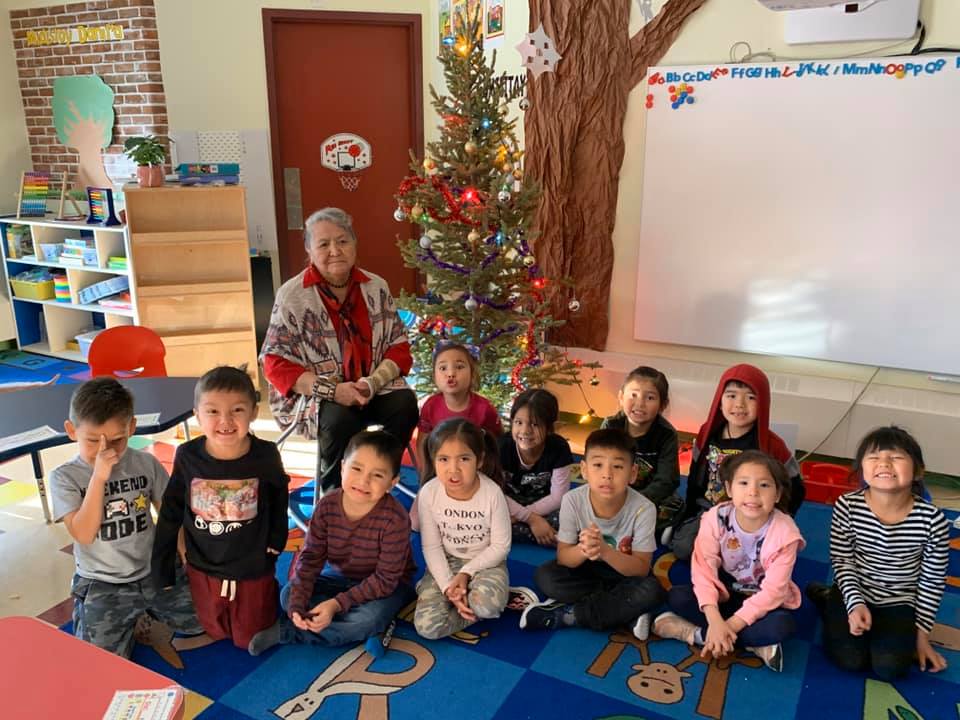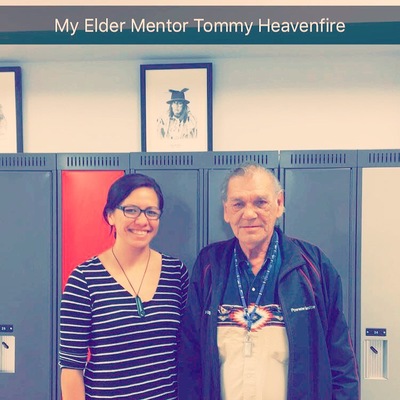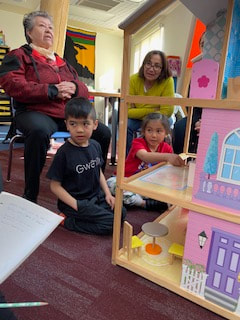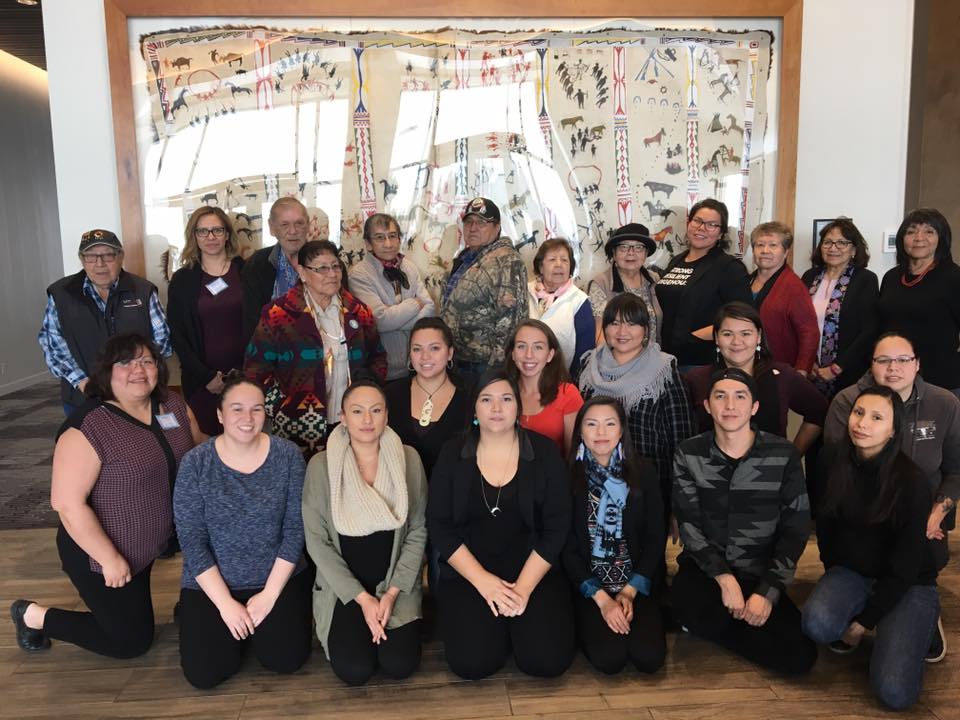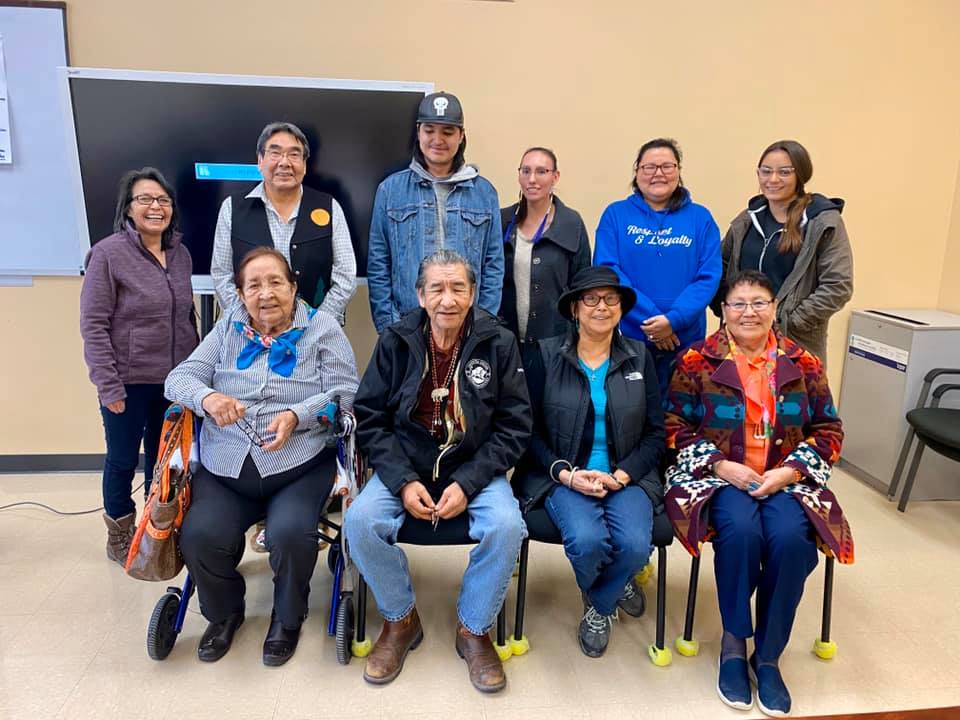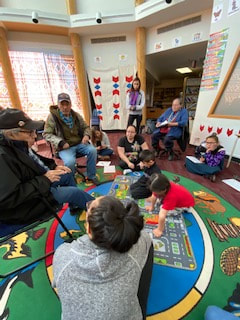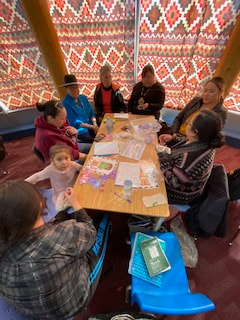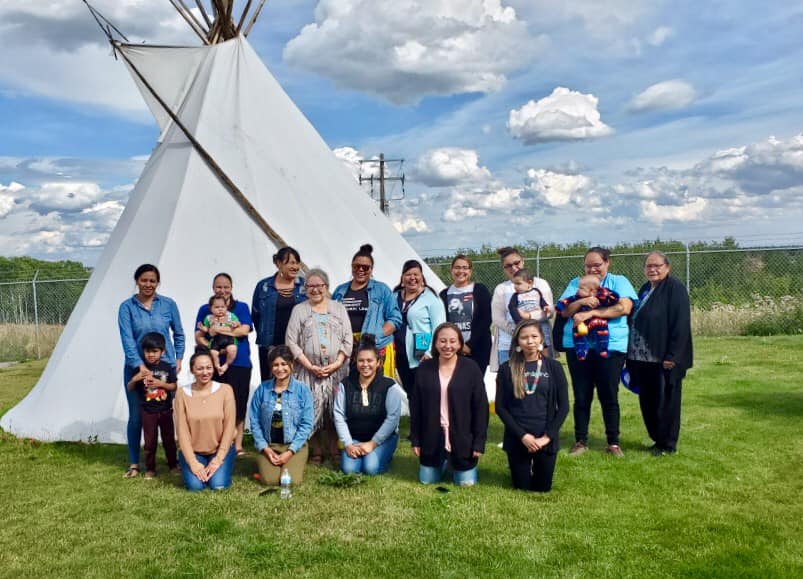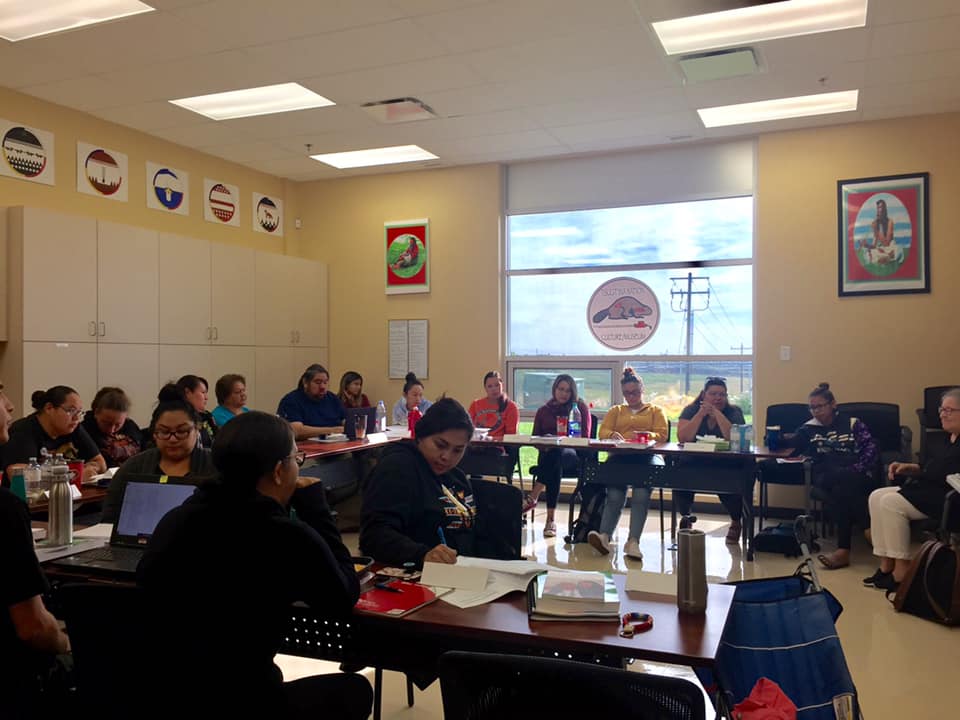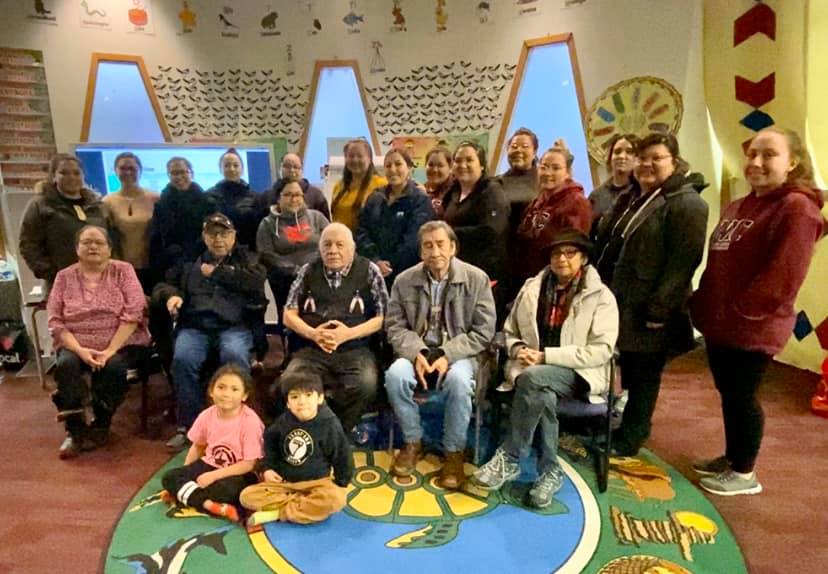CREATING A LANGUAGE COMMUNITY
It is imperative to the survival and revitalization of our indigenous languages to create, support, maintain and inspire a community of language learners. Tsúut’ínà Gunáhà is dedicated to creating the opportunities for language learning to happen across all ages and stages of learners with our teachers and Elders.
EARLY LEARNINGCreating the space to immerse and interact with our youngest learners in Tsúut’ínà Gunáhà has developed over the last few years with partnerships with the Tsúut’ínà Daycare and Tsúut’ínà Headstart to incorporate and encourage more language use with songs, dances, activities, games and daily communication. Children can learn languages more quickly and with greater success with early introduction to language immersion and have a greater aptitude and "ear" for recognizing unique sounds of the language.
|
|
TSUUT'INA NATION SCHOOL
LANGUAGE PROGRAMMING
Tsúut’ínà Gunáhà was introduced and taught in the Tsúut’ínà Nation Schools since the 1980s, with our fluent elders being the primary teachers. The pupils of those elders are now carrying on the roles of teaching the language in the schools as apprentices of our Elder Mentors. Tsúut’ínà Gunáhà Násʔághà Trains and administers language programming from K4 to Grade 12 including the Adult Education in Bullhead Adult Education Center. The long-standing partnership with Tsúut’ínà Education has been a cornerstone for the continuation and dedication to the revitalization of Tsúut’ínà language and culture in our children and community.
COMMUNITY ENGAGEMENT
|
The Tsúut’ínà Gunáhà Násʔághà is involved with various programs throughout the Nation. Language learning is about stages not ages and we encourage everyone in the community to take on the task of helping and supporting language revitalization by being a part of it. We offer community language and culture opportunities such as summer Culture Camps, Translation Requests, Evening Classes Department/Program Language Classes, Elder Recording Project, Culture Teachings, Language Events, and supporting with an Elder/Mentor. It is important that we offer for the opportunity for everyone in the community to learn to help establish, support and maintain a community of language learners.
|
|
MENTOR-APPRENTICE PROGRAM
Mentor-Apprentice is the process of pairing up apprentices of the language with fluent Elder Mentors in order to learn the language through immersion techniques and methodology. It is a learner driven process with the learner providing the context for the language they want to acquire. This method allows for language use to be relevant to the learner and usability within their daily lives. Tsúut’ínà Gunáhà trains and administers this methodology for Tsúut’ínà Gunáhà Násʔághà teachers to be the catalyst for learning and in turn teaching and delivering language programming. This methodology also promotes intergenerational relationships and learning with our Elders and Knowledge keepers. The Tsúut’ínà Gunáhà Násʔághà Staff practice the Mentor-Apprentice program. All the Gunaha Staff have their Mentors they visit during class prep time, after school, after work, and on their free-time. The funding is available for all Gunaha Staff to coordinate with their Mentor to find time available that works for them both. Also, in the Language and Culture Committee Work plan, they have six (6) Youth/Apprentices that will be learning from each Committee Member. The Youth/Apprentices Job Description is the Mentor-Apprentice Program, they are paid five days in the week to learn the Tsúut’ínà ninisha and Tsúut’ínà language from their Mentor. Whereas the Tsúut’ínà Gunáhà Násʔághà Staff have to find time available during or after work and class schedules.
SPEAKER SOCIALS
The Tsúut’ínà Gunáhà Násʔághà staff meet with the Elders/Fluent Speakers twice a month for our regular Speaker Socials. The Speaker Socials gives the Gunáhà Staff a chance to visit, learn, and to speak as muchTsúut’ínà language. The Speakers Socials are audio and video recorded to document language use. The Tsúut’ínà Gunáhà Násʔághà Staff will be present at each gathering to witness Tsúut’ínà being used freely by the fluent speakers. The goal is to create an immersion setting where people can be exposed to the Tsúut’ínà language in its most natural form.
Initially, the Speaker Socials started out as small gatherings of Elders/Speakers for the simple task of just visiting one another using the Tsúut’ínà language. They would talk about anything from stories of the past, to their current day to day lives all in the Tsúut’ínà language. Equally important, today we utilize the Speaker Socials to gather and practice translations for language lessons for their classrooms. Also, we practice the mentor-apprentice program with our mentors. We practice the program with the mentors to get them used to the method of just speaking Tsúut’ínà, because some of the Elders/Fluent Speakers forgot some language. And being surrounded by each other in a group setting helps the Speakers/Elders remember language they don't use anymore.
Initially, the Speaker Socials started out as small gatherings of Elders/Speakers for the simple task of just visiting one another using the Tsúut’ínà language. They would talk about anything from stories of the past, to their current day to day lives all in the Tsúut’ínà language. Equally important, today we utilize the Speaker Socials to gather and practice translations for language lessons for their classrooms. Also, we practice the mentor-apprentice program with our mentors. We practice the program with the mentors to get them used to the method of just speaking Tsúut’ínà, because some of the Elders/Fluent Speakers forgot some language. And being surrounded by each other in a group setting helps the Speakers/Elders remember language they don't use anymore.
RESOURCE DEVELOPMENT
The Tsúut’ínà Gunáhà Násʔághà offers a wide range of Tsúut’ínà language, culture, and history resources available free of charge to community members. Some of the resource we offer include: Anthology collection, colouring books, children’s story books, training manuals, dictionaries, sound files, Gunasi DVD, Isuu Nasʔagha Episodes 1-3, Gunaha Songs, Workplace Language Handbook, Tsúut’ínà Language App, Tsúut’ínà Culture Camp DVD, Motivational Posters, Classroom Material, and so much more!
The Tsúut’ínà Gunáhà Násʔághà is currently creating resources that will be made available online. We are currently working on a language database, digitizing of existing non-digital language materials, adaptation of existing learning materials for additional/new technological platforms, i.e., online programs. Also. development of online resources, such as a Website. Indigenous language technology is essential for language revitalization efforts. The Tsúut’ínà Gunáhà Násʔághà hopes to carry out and support the technology related to the Tsúut’ínà language.
Check out our Resource Page
The Tsúut’ínà Gunáhà Násʔághà is currently creating resources that will be made available online. We are currently working on a language database, digitizing of existing non-digital language materials, adaptation of existing learning materials for additional/new technological platforms, i.e., online programs. Also. development of online resources, such as a Website. Indigenous language technology is essential for language revitalization efforts. The Tsúut’ínà Gunáhà Násʔághà hopes to carry out and support the technology related to the Tsúut’ínà language.
Check out our Resource Page
LANGUAGE AND CULTURE
CURRICULUM DEVELOPMENT
Since 2017, theTsúut’ínà Education Department and Tsúut’ínà Gunáhà Násʔághà created a partnership to support Tsúut’ínà Language and Culture Curriculum Development. Our goal is to implement Tsúut’ínà Ninisha (Way of Life) throughout Tsúut’ínà Nation School Programming.
In the past few years, Culture Teachings include teachings per season. For example, Xaazini - Fall Teachings, during the Fall the Culture Teachings are Protocols, Pipe Ceremony, Treaties, Chiefs of Tsúut’ínà, Fire Teachings, Nature Survival Walk, Buffalo Teachings, and other relevant culture teachings. The Tsuut'ina Gunaha Institute and the Curriculum Development/Culture Team also host seasonal Culture Camps for the Tsúut’ínà Nation Schools and Community. It's essential for land-based learning for the students, teachers, and staff. Overall, we are continuing in learning our traditional ways, it will take practice and patience to decolonize ways of teaching Tsúut’ínà ninisha. Eventually there will be a new Language and Culture Curriculum implemented within the Tsúut’ínà Nation Schools.
In the past few years, Culture Teachings include teachings per season. For example, Xaazini - Fall Teachings, during the Fall the Culture Teachings are Protocols, Pipe Ceremony, Treaties, Chiefs of Tsúut’ínà, Fire Teachings, Nature Survival Walk, Buffalo Teachings, and other relevant culture teachings. The Tsuut'ina Gunaha Institute and the Curriculum Development/Culture Team also host seasonal Culture Camps for the Tsúut’ínà Nation Schools and Community. It's essential for land-based learning for the students, teachers, and staff. Overall, we are continuing in learning our traditional ways, it will take practice and patience to decolonize ways of teaching Tsúut’ínà ninisha. Eventually there will be a new Language and Culture Curriculum implemented within the Tsúut’ínà Nation Schools.
TSUUT'INA LANGUAGE
AND CULTURE COMMITTEE
The Tsúut’ínà Gunáhà Násʔághà in partnership with the Language Commissioner, created a Language and Culture Committee. The intent for the Language and Culture Committee will provide regulation, guidance, and priorities on the Tsúut’ínà language and culture programming for the Tsúut’ínà Nation. The services are facilitated by the Tsúut’ínà Gunáhà Násʔághà, and the Tsúut’ínà Education Department. The committee assists in the Tsúut’ínà language and culture content validation, approval process and standardization. The committee operates in a collaborative and respectful manner and engage in consensus-based decision making.
TSUUT'INA GUNAHA
TEACHER TRAINING
Ongoing staff development and classroom management training is essential to operate a meaningful school language program. In 2013, the Tsúut’ínà Gunáhà Násʔághà, in collaboration with Alberta Educations Locally Developed Courses Department developed a 12 year accredited curriculum that captured essential aspects of Tsúut’ínà language, history and culture in an easy to follow format. The Tsúut’ínà Gunáhà Násʔághà teaching staff is still in the process of familiarizing and implementing the curriculum into the Nation's education system.
Currently, the Gunaha Staff are taking time to focus on Fluency Development Training with Tsúut’ínà Fluent Speakers. The staff have completed courses through the University of Alberta and the Courses are aimed at Tsúut’ínà language, such as Phonology and Syntax.
Tsúut’ínà Gunáhà Násʔághà Staff have also completed the Certificate in Indigenous Language Revitalization with the University of Victoria. The CILR Program delivers Linguistic Training in Language Revitalization, Language Learning, Tsúut’ínà Language, and Dynamics of Indigenous Language Shift. Equally important, the Teacher Training has given Gunáhà staff to transfer credits to attend the University of Calgary. On-going training and learning for language revitalization is essential for language teachers and language activists. The Tsúut’ínà Gunáhà Násʔághà Director ensures all Gunaha Staff are trained and informed with new ways of language revitalization efforts.
Currently, the Gunaha Staff are taking time to focus on Fluency Development Training with Tsúut’ínà Fluent Speakers. The staff have completed courses through the University of Alberta and the Courses are aimed at Tsúut’ínà language, such as Phonology and Syntax.
Tsúut’ínà Gunáhà Násʔághà Staff have also completed the Certificate in Indigenous Language Revitalization with the University of Victoria. The CILR Program delivers Linguistic Training in Language Revitalization, Language Learning, Tsúut’ínà Language, and Dynamics of Indigenous Language Shift. Equally important, the Teacher Training has given Gunáhà staff to transfer credits to attend the University of Calgary. On-going training and learning for language revitalization is essential for language teachers and language activists. The Tsúut’ínà Gunáhà Násʔághà Director ensures all Gunaha Staff are trained and informed with new ways of language revitalization efforts.
"Children alone should not have to shoulder the responsibility for revitalizing the language; they require active support to practice their language skills and to see the value of the language and its relevance in daily life within their own homes"
Proudly powered by Weebly

